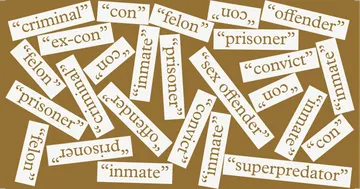Federal prison employees are bracing themselves for a legal fight, after President Donald Trump signed an executive order last week to end collective bargaining for most federal employees. The announcement, aimed at unions across dozens of executive branch departments, explicitly included the Bureau of Prisons, creating more confusion at an already struggling agency.
Labor leaders say the move is devastating for the bureau, and silences a union representing over 30,000 people at more than 120 federal prisons nationwide. It’s the latest and biggest hit to a workforce that includes many supporters of Trump’s “tough on crime” campaign rhetoric.
The Council of Prison Locals, a unit of the larger American Federation of Government Employees, represents federal prison staff in collective bargaining about working conditions. Union officials may also help employees who face disciplinary action or other arbitration cases. Many fear Trump’s decision will exacerbate an ongoing staffing crisis and put officers and prisoners at risk.
“People are still in shock,” said Brandy Moore White, national president of the Council of Prison Locals. “I think a lot of people felt secure in the fact that while we are a union, we are a law enforcement union, and we do work with both sides,” referring to Republicans and Democrats.
Edward Canales is among the people still reeling from the news. The military veteran worked in the federal prison system for almost 30 years, and has spent more than a decade as president of his local federal prison employees’ union in California. He voted for Trump three times, and said most of his colleagues did the same. “We were voting on the fact that he was going to back law enforcement; he was going to back veterans,” Canales said.
Now he feels hurt and betrayed, he said. “I’m not going to sit there and hate on him or talk bad about him,” Canales said of Trump. “But I will call out somebody that made promises and doesn’t keep them.”
Canales was employed at FCI Dublin, a federal prison that was recently closed after multiple instances of sexual assault and abuse by the warden and other employees. The union was in the process of negotiating with the bureau to relocate the remaining staff to other facilities, negotiations that are now on hold.
In an emailed statement, the Bureau of Prisons declined to comment on the presidential order and its impact. The White House did not respond to a request for comment Monday.
Federal prison staff have been unionized for decades. Trump’s new order aims to nullify the contract that the union and the Bureau of Prisons have negotiated. It would make officers’ employment “at will,” meaning that they could be fired at any time, for any reason. It could also mean that union officials can no longer represent their members in employment disputes. The executive order mirrors plans laid out in Project 2025, the policy playbook created by conservative think tank the Heritage Foundation.
Proponents of the union say that without its protections, it will be harder to recruit and retain employees in a system already so understaffed that cooks, nurses and teachers have been forced to act as correctional officers overseeing more than 140,000 federal prisoners. The Department of Justice’s Inspector General’s Office said understaffing has had a “cascading effect on institution operations,” putting staff in danger and contributing to prisoner deaths.
The federal prison union “has consistently sounded the alarm on the chronic staffing shortages in the federal prison system,” said David Fathi, director of the American Civil Liberties Union National Prison Project. While there are cases where the union has “frustrated and undermined accountability,” Fathi said, “we have frequently seen prison staff unions align themselves with incarcerated people to press for safer conditions.”
Discontent had been brewing among some federal prison guards. Within weeks of Trump’s inauguration, the bureau announced it was cutting recruitment and retention bonuses from officers’ salaries, which had increased pay by 10% to 25%.
Other recent Trump policies have affected the federal prison system, including one targeting transgender prisoners, which has thrown the bureau’s system for gender-affirming care into chaos.
The executive order on unions comes at a time when federal prisons are facing unprecedented uncertainty. At least six top officials have left the agency since Trump took office, and there is currently no acting director or deputy director. The agency’s reputation has suffered in recent years as details have emerged of crumbling infrastructure and numerous incidents of staff members beating and sexually assaulting prisoners.
In a fact sheet accompanying the order last week, the Trump administration said the new policy would “safeguard American interests” by ending what he described as the unions’ obstruction of the president’s agenda. But labor leaders say this move instead undermines security at all federal prisons.
“The most important thing for [corrections officers] is we make sure they work in a safe environment,” said Jose Rojas, a former federal officer and union leader in Florida. For example, the union successfully lobbied in 2016 to provide pepper spray to all employees at medium, high and maximum security prisons, in a law named for Eric Williams, an officer who was killed on the job. Union organizers also worked to get officers stab-resistant vests, Rojas said, and to require high-security units to be staffed by at least two people.
One union official from Texas, who voted for Trump, said these policies are an example of the union’s necessity. He asked not to be named because he fears retaliation from prison officials now that he may be without union protection. “I was fighting against bureaucracy to make our staff safer,” he said.
The union is not universally supported, among staff or prisoners. Where some see a bulwark against management’s whims, others see a layer of protection for bad actors.
“On a day-to-day basis, the union is a threat to the well-being of most inmates,” wrote Jeffrey Heckman, who is serving time in a federal prison in Indiana. “It’s what guarantees that the officer who beats you will get away with it. Maybe a lack of a union can result in more transparency here.” The Marshall Project previously reported on how a warden tasked with reforming a prison in Illinois that had an “enormous problem with inmate abuse” found the union to be a roadblock for change.
Some prison staff also supported Trump’s decision, and said the union practiced favoritism. “They help the people they want to help and then the people they don’t want to help get thrown out in the cold,” said one former officer, who asked not to be named because of an ongoing dispute with the bureau over retirement benefits. “These union stewards, they’re out for their own profits and protection.”
Unions representing federal correctional officers exist in an uneasy space, politically speaking. Organized labor has traditionally supported Democrats, but law enforcement tends to include more conservative voters. Still there was a strong anti-Trump sentiment among federal prison workers in 2020, skeptical of Trump’s well-known anti-union stance. The union representing correctional officers did not endorse a candidate in the last two elections, unlike its parent union, the American Federation of Government Employees, which backed Joe Biden in 2020 and Kamala Harris in 2024.
Trump’s order included agencies like Immigration and Customs Enforcement and other sectors of the Department of Homeland Security. Even before last week’s announcement, the administration had cancelled the collective bargaining agreement for officers with the Transportation Security Administration, which led the American Federation of Government Employees to file a lawsuit to try to block the move.
The union representing employees in the Department of Treasury, which was also named in the executive order, filed suit against the Trump administration on Monday.
Some labor law experts are skeptical that Trump’s latest order can withstand a legal challenge. In the meantime, unions are setting up alternative ways to collect dues, now that they can’t pull directly from workers’ paychecks. Some union officials are hurrying to gather all the sensitive information they have stored in their agency offices or on computers, before it can be deleted or they get locked out, one union organizer said.
Eric Young, former national president of the federal prison workers’ union, said eliminating collective bargaining rights will make it impossible to keep the prisons adequately staffed. Most union members are staunch conservatives, he said. “They believe in a law enforcement presence. They do a great job to protect the country,” Young said. “If the management is going to literally fire us for nothing, why should we stay?”
An earlier version of this story incorrectly described the Council of Prison Locals' endorsement in the 2020 election. The council did not endorse a candidate for president that year.

